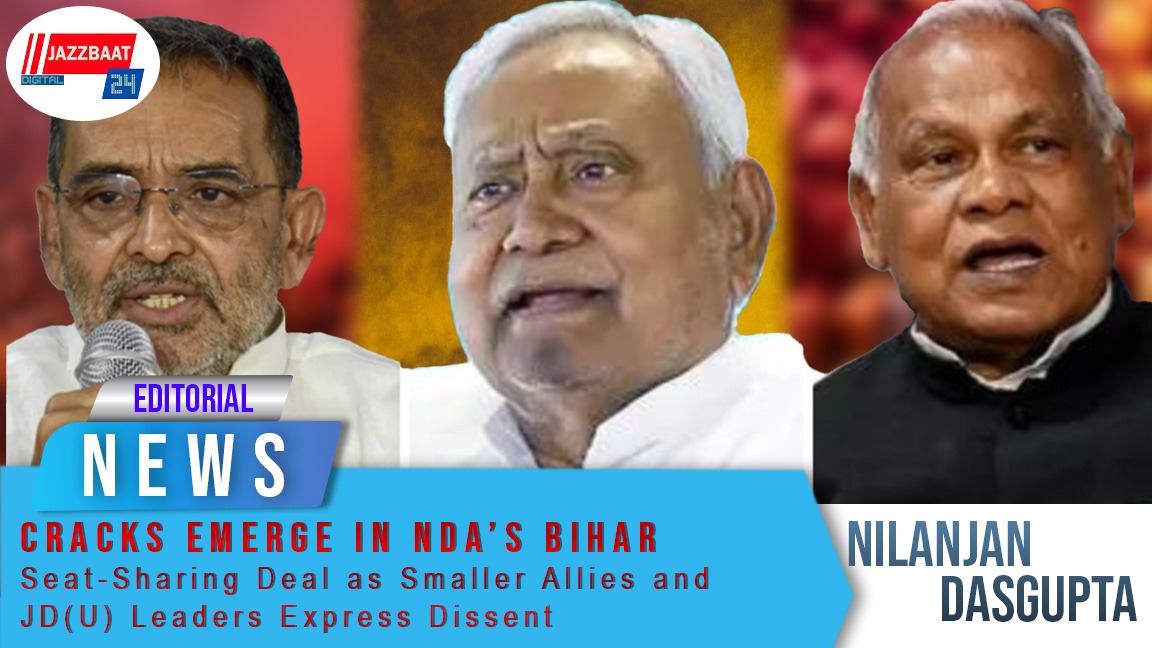
Tensions have surfaced within the National Democratic Alliance (NDA) in Bihar just days after the coalition announced its seat-sharing arrangement for the upcoming state assembly elections. The deal, which gave both the Bharatiya Janata Party (BJP) and Nitish Kumar’s Janata Dal (United) an equal share of 101 seats each, has sparked unrest among several allies including the Rashtriya Lok Morcha (RLM), the Hindustani Awam Morcha (HAM), and even within the JD(U) itself.
The allocation of 29 seats to Chirag Paswan’s Lok Janshakti Party (Ram Vilas) [LJP (RV)] has become a flashpoint. Many in the JD(U) view the move as a betrayal, recalling that in the 2020 assembly polls, Paswan’s party had fielded candidates against JD(U) nominees, splitting the NDA vote and weakening Nitish Kumar’s position. Although Paswan’s outfit performed well in the 2024 Lok Sabha elections winning all five seats it contested its generous seat allocation in the state deal has left other partners dissatisfied.
RLM chief Upendra Kushwaha has been at the forefront of the discontent. His party, which was allotted six seats, has expressed clear dissatisfaction with the arrangement. Following a series of late-night discussions in Patna with senior NDA leaders, Kushwaha described the situation as “not well” within the alliance before leaving for New Delhi to meet Union Home Minister Amit Shah. While he later struck a conciliatory tone, saying that issues were being addressed, his earlier remarks indicated deep unease about the internal coordination and fairness within the NDA structure in Bihar.
The Hindustani Awam Morcha, led by Jitan Ram Manjhi, has also voiced frustration. The party had demanded at least 15 seats but received only six. Manjhi has publicly sympathized with JD(U) leaders upset over losing their traditional constituencies to Paswan’s party. He signaled that his own candidates would contest from Bodh Gaya and Makhdumpur, even if it meant pushing back against the final allocation.
Within the JD(U), the dissatisfaction is more visible. Senior party figures, including Bhagalpur MP Ajay Kumar Mandal and Gopalpur MLA Gopal Mandal, have expressed open rebellion. Ajay Kumar Mandal offered to resign from his parliamentary post, citing being sidelined during ticket distribution, while Gopal Mandal staged a sit-in protest outside Nitish Kumar’s residence demanding renomination from his constituency. Such open defiance underscores the growing strain within a party that has long prided itself on internal discipline under Nitish Kumar’s leadership.
JD(U) leaders, however, have attempted to downplay the situation. Party working president Sanjay Kumar Jha dismissed talk of division, insisting that Nitish Kumar remains in full command and that all decisions were made collectively with his approval. Yet, the ground reality suggests that resentment runs deep, particularly among local leaders whose influence in their constituencies has been undermined by the seat redistribution.
The BJP, for its part, has maintained an assertive silence. The party’s central leadership has emphasized unity, focusing on the symbolism of placing the BJP and JD(U) on equal footing for the first time. By allocating equal seats to both, the BJP appears to be balancing its national ambitions with the need to maintain Nitish Kumar’s regional authority. However, the BJP’s decision to back Paswan’s LJP (RV) with a larger share reflects the growing importance of the Dalit vote bank and Paswan’s recent electoral success at the national level.
Political observers believe that the seat-sharing deal was designed to maximize the NDA’s chances against the opposition Rashtriya Janata Dal (RJD)-led alliance. But the cracks appearing so early in the process suggest that internal negotiations were rushed and lacked consensus-building. The discontent among smaller allies like RLM and HAM could lead to last-minute withdrawals or even independent contests in some constituencies moves that would inevitably weaken the NDA’s prospects in a closely contested election.
The timing of these developments is critical. Both BJP and JD(U) have already begun releasing their candidate lists. On Tuesday, the BJP announced 71 names, while the JD(U) followed on Wednesday with 57 candidates. Despite the public show of unity in their official statements, insiders acknowledge that the morale of local workers has been affected. Several ground-level JD(U) members are reportedly unhappy about losing seats to LJP (RV) and question whether the alliance is being driven more by central directives than by Bihar’s political realities.
For Nitish Kumar, who has built his political brand on governance and stability, the unfolding turmoil poses a fresh test of leadership. His ability to reconcile the ambitions of allies and maintain cohesion within the NDA will determine not only his immediate electoral fortunes but also his long-term standing within the coalition. Meanwhile, the BJP’s leadership especially Home Minister Amit Shah faces the delicate task of managing egos and ensuring that dissent does not turn into defection.
The Bihar elections are shaping up to be a multi-layered battle. On the surface, the NDA presents a united front, projecting Nitish Kumar as the chief ministerial face once again. Beneath that, however, simmering dissatisfaction threatens to unravel months of alliance-building. If unresolved, the dispute over seat sharing could echo the fissures seen in 2020, when internal rivalries cost the alliance several key constituencies.
As campaigning gains momentum, the NDA will need to focus not just on defeating the opposition but also on healing the fractures within its own ranks. Whether Nitish Kumar and the BJP leadership can manage that balance in time will determine whether the NDA can replicate its past electoral successes or watch them slip away to internal discord.